
What Is The Ayurvedic Diet?
The Ayurvedic diet is based on an ancient system of medicine that has historical roots in India. This diet is personalised and adjustable, encouraging mindful eating and attunement between body and mind. Learn more about its history, and find out how it works below.
Ayurveda is a holistic system of medicine with historical roots on the Indian subcontinent. Today, it is widely practised in India and Nepal, and is becoming increasingly popular across Western countries. It focuses on creating a balance between body and mind. The Ayurvedic diet is based on this system and has been around for thousands of years. It aims to promote balance in the body and, by extension, our whole system.
In Ayurveda, recommendations about which foods to eat and which to avoid are personalised according to different aspects of your physical and mental constitution. Find out what this means below.
What are doshas in Ayurveda?

According to Ayurveda, the universe is made up of five elements: aakash (space), jala (water), prithvi (earth), teja (fire), and vayu (air). Doshas are defined as the three types of energy that circulate in the body, and are believed to be made up of the five elements.
Known as vata, kapha, and pitta, these doshas are thought to determine our physiological, mental, and emotional health. The reason Ayurvedic diets are personalised is that each of us is said to have a unique ratio of the doshas. One person may be predominantly vata, while another may be predominantly kapha. To find out which dosha you are, you can use a specific questionnaire or ask an Ayurvedic practitioner.
Finding out your proportion of each of the three doshas is said to be central to achieving optimal physiological, mental, and emotional health, as it allows you to adjust your diet accordingly.
What does each dosha look like?
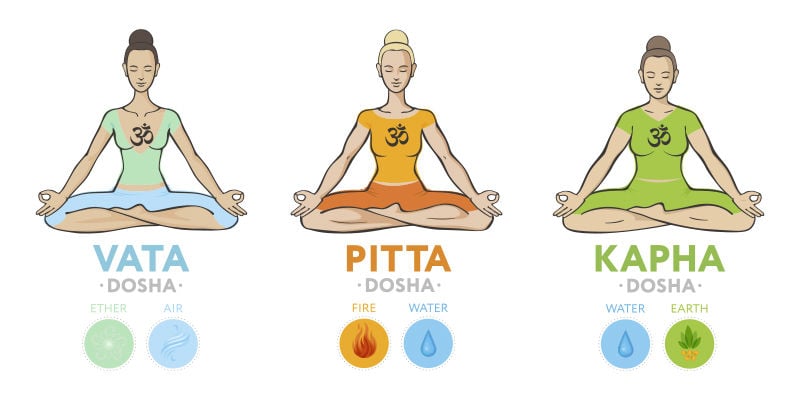
Let's take a closer look at what these terms actually mean.
Vata
Vata is primarily made up of the elements air and space, or vayu and aakash. This dosha is associated with cold, light, flowing, spacious, dry, and harsh qualities, and it's represented in the season of autumn.
People with vata as their main element are generally described as creative, energetic, and lively, with rather slender, light bodies. It is typical for vata people to think outside the box, and they are sensitive to distractions. Their moods are strongly influenced by external conditions such as the weather, other people, and food.
When out of balance, vata people may have digestive problems and struggle with fatigue or anxiety.
To maintain balance, it is thought that vata-dominant people need a regular daily routine with integrated calming activities, such as meditation, to manage stress. On a physiological level, these individuals should keep their bodies warm by eating and drinking warm foods and protecting themselves from cold weather.
Pitta
The pitta dosha is based on the elements fire and water, or teja and jala. Representing the summer, this dosha is described as oily, liquid, mobile, light, pungent, and, of course, hot.
Pitta-dominant people are typically intelligent, decisive, and hardworking characters with strong leadership qualities. They are competitive and highly motivated to achieve their goals. They usually have muscular bodies and tend to be very athletic.
While their qualities can be channelled in a constructive way, their nature can be aggressive and stubborn, which can lead to conflict.
According to Ayurvedic medicine, pitta-dominant people should ensure a healthy work-life balance. On a physiological level, they should avoid extreme heat in the form of hot sunshine or spicy food.
Kapha
Kapha is made up of the elements earth and water, or prithvi and jala, and is represented in spring. It is generally described as slow, cold, soft, heavy, steady, and stable.
People with this dosha are said to be calm, grounded, and naturally quiet. These individuals are loyal, caring characters with strong, sturdy bodies. They are the kind of people who keep things together, rarely get upset, and have a slow, thoughtful approach to life. They are often a great support to others.
Kapha-dominant people typically have a slow metabolism and tend to gain weight relatively easily. They may be prone to sluggishness and over-sleeping, and have a higher risk of asthma, heart disease, diabetes, and depression.
These people should take up regular exercise, maintain a healthy body temperature, and keep up a regular sleep routine.
Foods to eat and avoid
As mentioned above, the Ayurvedic diet recommends that you eat and avoid certain foods and drinks based on your personal dosha ratio. Read on to find out how to tailor your diet to suit your type.
Vata
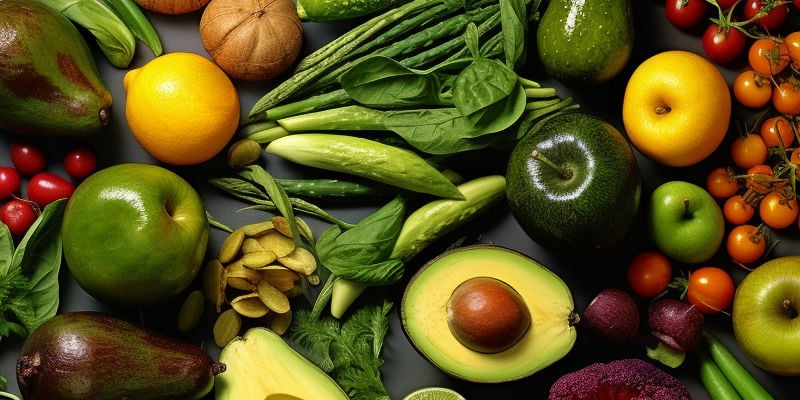
Foods that you should eat and avoid if your dosha is vata include the following.
Fruit
-
Do: Ripe bananas, cooked apples, apricots, berries, cherries, coconut, figs, grapes, mango, oranges, peaches, pineapple, grapefruit, melons.
-
Limit: Raw apples, cranberries, pears, pomegranate, dried fruit, dried plums, watermelon.
Vegetables
-
Do: Avocado, beets, carrots, asparagus, green beans, cucumber, small amounts of chillies, parsnip, pumpkin, spinach (cooked), zucchini, squash, sweet potato, watercress.
-
Limit: Bell peppers, hot peppers, white potatoes, broccoli, cauliflower, fresh corn/maize, kohlrabi, mushrooms, green olives, raw spinach, tomatoes, aubergines, celery.
Grains, legumes, and nuts
-
Do: Amaranth, oats (cooked), quinoa, rice, red lentils, tofu, mung dal, peanuts, cashews, hazelnuts, walnuts, sunflower seeds.
-
Limit: Buckwheat, couscous, oat flakes, rye, chickpeas, kidney beans, black beans, soybeans, tempeh.
Meat, dairy, and dairy alternatives
-
Do: Beef, chicken, eggs, fish, duck, seafood, brown turkey, cow's milk, yoghurt, almond milk, cashew milk, cheese, butter, goat's milk, hemp milk, ice cream (not too much), rice milk, sour cream, soy milk.
-
Limit: Lamb, rabbit, venison, pork, white turkey, frozen yoghurt.
Herbs and spices
-
Do: Ginger, fennel, chamomile, ashwagandha, anise, basil, black pepper, cumin, cloves, cinnamon, mustard seeds, nutmeg, rosemary, thyme, turmeric, vanilla, salt, peppermint, coriander, ginseng.
- Limit: Cayenne pepper, chilli, horseradish, neem leaves.
Pitta
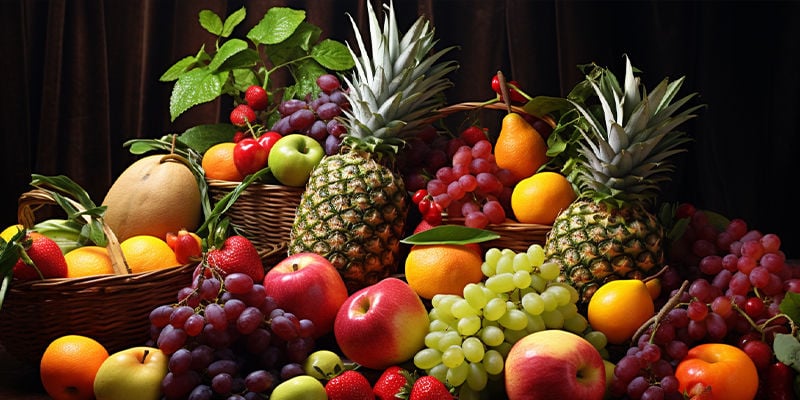
If you are a pitta-dominant, you should eat/avoid the following foods, among others.
Fruit
-
Do: Apples, apricots, cherries, coconut, pears, pineapples, plums, pomegranates, strawberries, melons, limes, mangoes, watermelon.
-
Limit: Sour fruit, unripe fruit.
Vegetables
-
Do: Bell peppers, broccoli, artichokes, cabbage, cauliflower, Brussels sprouts, leafy greens, lettuce, mushrooms, okra, pumpkin, parsnip, squash, watercress, zucchini.
-
Limit: Horseradish, mustard greens, peppers, tomatoes, chillies, turnips, beets.
Grains, legumes, and nuts
-
Do: Couscous, oats, quinoa, buckwheat, amaranth, wheat, tapioca, flaxseed, sunflower seeds, pumpkin seeds, all pulses except soy, moderate amounts of soaked and peeled almonds.
-
Limit: Buckwheat, corn/maize, rye, brown rice, cashew nuts, macadamia nuts, pecan nuts, sesame seeds, walnuts, pine nuts.
Meat, dairy, and dairy alternatives
-
Do: Chicken, fish (freshwater), eggs, shrimp, venison, cow's milk, butter, soft cheese, moderate amounts of hard cheese, ghee, ice cream.
-
Limit: Beef, fish (saltwater), pork, duck, lamb, sour cream, cultured buttermilk, yoghurt.
Herbs and spices
-
Do: Coriander, mint, shatavari, rose, cardamom, cumin, fennel, mint, neem leaves, parsley, turmeric, vanilla, tarragon, moderate amounts of basil, ginger, rosemary, black pepper.
- Limit: Anise, paprika, sage, salt, marjoram, cloves, nutmeg, oregano, mustard seeds, thyme.
Kapha
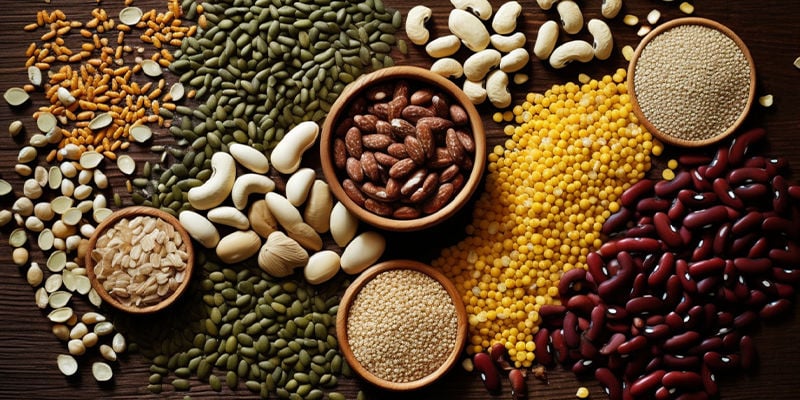
As a kapha person, here are some of the foods you should eat and avoid.
Fruit
-
Do: Apricots, berries, cranberries, dried figs, lemon, lime, peaches, pears, mango, raspberries, strawberries, pomegranate.
-
Limit: Coconut, bananas, green grapes, kiwi, oranges, rhubarb, watermelon, papaya, melons, plums.
Vegetables
-
Do: Turnips, peppers, broccoli, cabbage, carrots, eggplant, garlic, leafy greens, kohlrabi, artichokes, asparagus, peas, spinach, bell peppers, white potatoes, sprouts, green beans, cauliflower, celery, brussels sprouts, bitter melon, radishes.
-
Limit: Cucumbers, raw tomatoes, courgettes, olives, sweet potatoes, pumpkin.
Grains, legumes, and nuts
-
Do: Corn/maize, buckwheat, quinoa, rye, spelt, amaranth, black beans, lentils, mung beans, tempeh, white beans, chia seeds, flax seeds, soaked and peeled almonds, sunflower seeds.
-
Limit: Cooked oats, wheat, rice (white, brown).
Meat, dairy, and dairy alternatives
- Do: Chicken (white), fish (freshwater), shrimp, venison, goat's milk, goat's cheese, almond milk, rice milk, yoghurt.
- Limit: Duck, fish (saltwater), pork, beef, butter, cow’s milk, cheese, ice cream, sour cream.
Herbs and spices
-
Do: Turmeric, triphala, black pepper, ginseng, fennel, ginger, peppermint, rosemary, tarragon, vanilla, cayenne pepper, chilli, cinnamon, cumin, cloves, basil, mint, horseradish, mustard seeds.
- Limit: Salt.
What are the benefits of an Ayurvedic diet?

The Ayurvedic diet is said to have many potential benefits, including:
-
Focuses on whole, unprocessed foods, which are generally better for you than processed foods.
-
Promotes mindful eating, which means listening to your body and being aware of what and how you eat. This means, for example, eating when you're hungry, stopping when you're full, and savouring every bite.
-
Promotes well-being by encouraging balance in body and mind.
-
It's flexible and sustainable because it can be adjusted and readjusted to suit personal needs, and doesn't require strict adherence to any rules.
-
It can encourage healthy behaviour in the long term.
What are the possible downsides of an Ayurvedic diet?
Although there are significant benefits associated with the Ayurvedic diet, there are some potential drawbacks, including:
-
Because it's not based on objective data, it can be difficult to determine your dosha.
-
It can be confusing due to the large number of rules/guidelines and the complexity of the doshas.
-
For people who are sensitive to eating disorders, the rules and restrictions of any diet could have a negative impact on their mental health.
Ayurvedic diet—yay or nay?
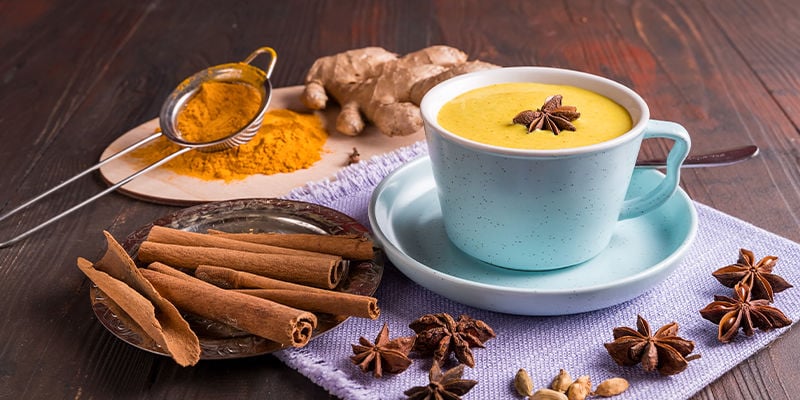
Ultimately, it's up to you to decide whether the Ayurvedic diet or approach to well-being is beneficial to your life. Given its long history and enduring popularity, it's certainly worth a try. So, which dosha are you?
-
 2 min
5 May 2023
How To Make Turmeric Tea
Turmeric is known for its anti-inflammatory and anti-oxidant properties. Making turmeric tea is a simple and delicious way to benefit from the power of the golden spice.
2 min
5 May 2023
How To Make Turmeric Tea
Turmeric is known for its anti-inflammatory and anti-oxidant properties. Making turmeric tea is a simple and delicious way to benefit from the power of the golden spice.
-
 4 min
14 April 2023
Triphala: What You Need To Know
When we look back at ancient medicines and natural remedies, some have stood the test of time, whereas others have not. One herbal concoction that's steeped in a rich history is Triphala. But does...
4 min
14 April 2023
Triphala: What You Need To Know
When we look back at ancient medicines and natural remedies, some have stood the test of time, whereas others have not. One herbal concoction that's steeped in a rich history is Triphala. But does...
-
 2 min
27 March 2023
Moringa: Everything You Need To Know
Moringa has been used for thousands of years, but does it have a place in the modern world? Available in various forms, from capsules to powdered extracts and dried leaves, discover everything this...
2 min
27 March 2023
Moringa: Everything You Need To Know
Moringa has been used for thousands of years, but does it have a place in the modern world? Available in various forms, from capsules to powdered extracts and dried leaves, discover everything this...
-
 4 min
2 March 2023
What You Need To Know About Ashwagandha
Ashwagandha has remained a staple in Ayurvedic tradition for thousands of years. Claimed to exhibit a whole range of benefits, here we look at the available research to see what it has to say about...
4 min
2 March 2023
What You Need To Know About Ashwagandha
Ashwagandha has remained a staple in Ayurvedic tradition for thousands of years. Claimed to exhibit a whole range of benefits, here we look at the available research to see what it has to say about...





 United States
United States











